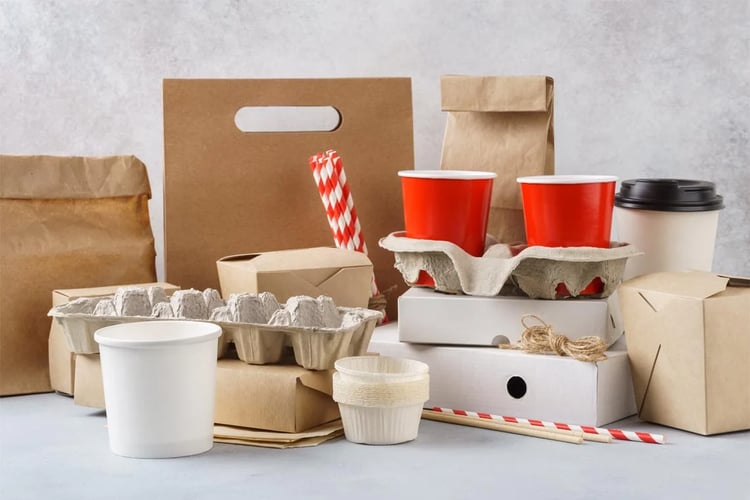
Eco-friendly packagings
- Home
- - Our Expertise
-
-
Eco-friendly packagings
Changes to containers and packaging
Mayrand supports you in this eco-friendly transition with containers and packaging that are tailored to your needs and respect new regulations, including those of the City of Montreal.
A multi-step transition
The Canadian, Quebec and municipal governments are changing regulations to reduce the country's overall environmental footprint. The banning of single-use plastics is one of the most far-reaching rules for the food industry and foodservice.
1
Effective December 20, 2022
Manufacturing or importing of foam #6 and black plastic containers is prohibited.
2
Effective March 28, 2023
The City of Montreal is banning the distribution of various single-use plastic items in Montreal food stores and restaurants, whether for on-site consumption, take-out or delivery.
3
Effective December 20, 2023*
The new regulation prohibits the sale or use of banned containers, including Styrofoam products.
*Source : Government of Canada
All about the Montreal regulation
Effective March 28, 2023
Photo Credits: City of Montreal
Find the complete line of eco-friendly packaging in our stores and at mayrand.ca
Take-out products prohibited for sale
Eco-friendly alternative packaging products available in our Mayrand stores
Compostable or non-compostable plastic items (#1 to #7)
- Cups
- Stir sticks
- Straws
- White cardboard, kraft, paper or wooden items
- White cardboard or kraft coffee cups
Other #6 polystyrene or #7 compostable plastic items
- Plates
- Containers
- Lids
- Trays (except for raw meat and fish)
- Utensils for take-out or delivery
Non-#6 and #7 items made of kraft cardboard, bagasse, pulp or plastic
- Laminated paper or cardboard plates
- Bagasse, pulp or polypropylene (PP) #5 containers
- PP #5 utensils
Exceptions and bans do not apply to:
- Non-profit food assistance organizations
- Establishments that only provide home delivery services (e.g., caterers or warehouses that do not host the public on site and deliver directly to their customers, either themselves or through an intermediary)
- Foods pre-packaged outside the establishment
- Plastic-coated cups and cardboard containers (whether compostable or not)
All about the waste management and reutilization lexicon
Understanding available materials
- Bagasse: Residual material from the extraction of sugar cane juice. It resembles paper and can be transformed into different types of packaging like re-sealable containers or utensils.
- PLA: Also called Polylactic Acid, this vegetable plastic made from corn starch is widely used in the manufacturing of glass as its insulating properties are ideal for hot drinks.
- Cardboard, pulp or paper: Be it paper packaging, flat cardboard, corrugated cardboard or kraft paper bags, all products made from wood cellulose are recyclable.
- Aluminum: Used for its insulating properties and resistance to high temperatures, this material is both practical and recyclable.
The seven plastic families
Plastic is a product derived from petroleum. There are seven families of plastics with different uses and recyclability rates.
PET #1 : Polyethylene terephthalate, a strong and flexible plastic
HDPE #2 : High-density polyethylene, plastic widely used in the food industry
PVC #3 : Polyvinyl chloride, flexible plastic
LDPE #4 : Low-density polyethylene, resistant plastic
Transparent water or juice bottles and food trays
Opaque milk or juice bottles, ice cream containers...
Plastic food wrap…
Plastic bags, cling film...
PP #5 :Polypropylene Plastic resistant to heat and transportation
PS #6 : Polystyrene Banned from use as of March 28 in Montreal and from sale as of December 20, 2023
PC, PTFE, melamine, etc. #7 : Many other plastics
Yogurt cups, transparent containers for prepared foods...
Exception for food trays (meat, fish...)
Polycarbonate: water bottles...


.png?width=1140&height=760&name=cd9a3cd497c6c87c3450444fad584e55f2811f01%20(1).png)






